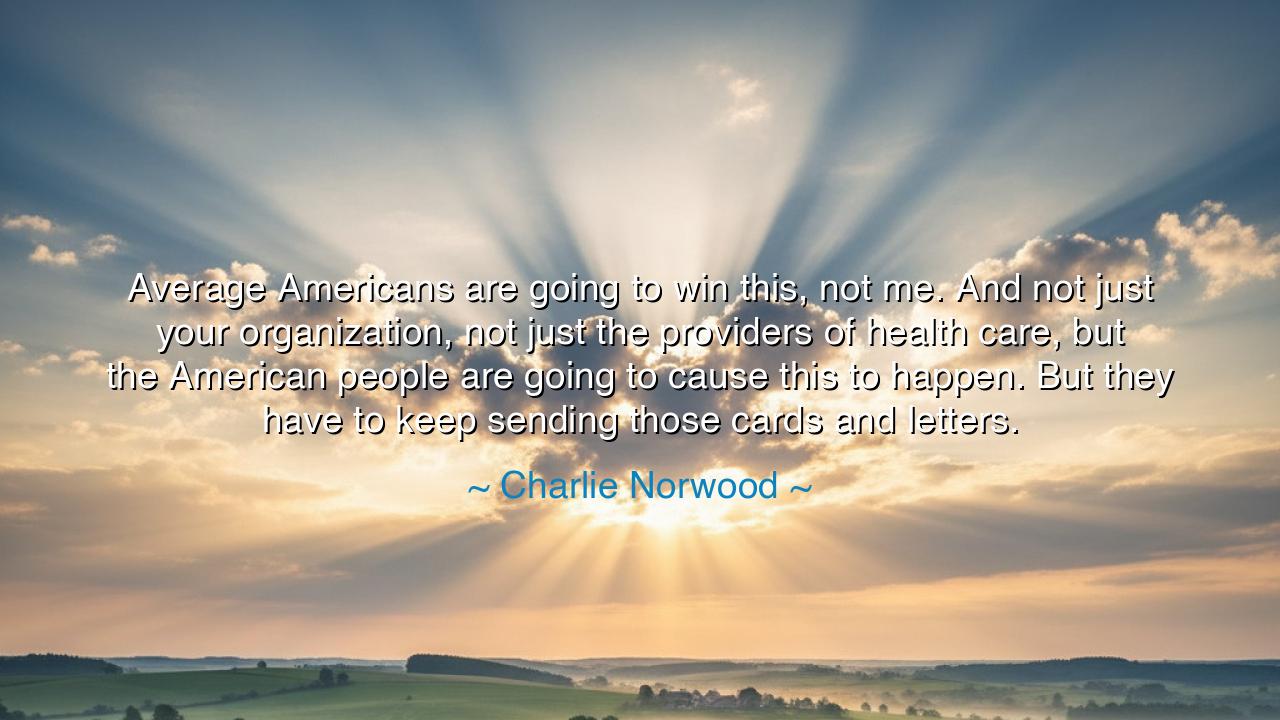
Average Americans are going to win this, not me. And not just
Average Americans are going to win this, not me. And not just your organization, not just the providers of health care, but the American people are going to cause this to happen. But they have to keep sending those cards and letters.






In the firm yet humble voice of a servant of the people, Charlie Norwood once said: “Average Americans are going to win this, not me. And not just your organization, not just the providers of health care, but the American people are going to cause this to happen. But they have to keep sending those cards and letters.” These words, born from the heart of a man who spent his life fighting for justice and reform in the realm of health care, are not mere political speech — they are a declaration of faith in the common spirit of humanity. Norwood, himself a dentist turned statesman, spoke not as a ruler, but as one who believed that the greatest power in a nation flows not from its leaders, but from its people.
To understand these words, we must first hear their echo in the long corridors of history. For this quote was spoken by Congressman Charlie Norwood, a man who fought to reform the American health care system and champion the rights of patients. In his time, he faced the vast machinery of bureaucracy and the entrenched interests of power — forces that often seem immovable. Yet he knew that lasting change could not be imposed from above; it must rise from below, from the voices of the “average Americans” — the citizens who labor, who love, who endure. He understood a truth as ancient as democracy itself: that the might of the people, when stirred by conviction, is greater than any throne or title.
When Norwood spoke of cards and letters, he was not simply speaking of paper and ink, but of participation — of the small, persistent actions by which ordinary people shape extraordinary destinies. Each letter sent, each voice raised, each act of courage in the name of justice, becomes a seed in the soil of transformation. The mighty oak of reform is born from such seeds. Norwood knew that one man, however passionate, cannot change a nation; but when thousands of hearts move together, mountains tremble. Thus he placed his hope not in his own strength, but in the united will of the people — a will that, when awakened, is unstoppable.
The ancients, too, understood this truth. When Solon of Athens laid the foundations of democracy, he did not command his people to obey — he urged them to participate. When Abraham Lincoln stood upon the battlefield at Gettysburg, he declared that government must be “of the people, by the people, for the people.” Norwood’s words breathe that same spirit. They remind us that the fate of nations is not decided by the powerful few, but by the steadfast many — by those who believe that their small voice, joined with others, can become a thunder that shakes the heavens.
Consider, too, the example of the Civil Rights Movement in America. It was not a single leader, not a single march, but millions of ordinary men and women — black and white, rich and poor — who wrote letters, who prayed, who stood unarmed before hate, and in doing so changed the course of history. Dr. King’s dream became reality only because the people carried it in their hearts. So it was with Norwood’s vision: he knew that no reform, no progress, could endure unless it was carried forward by those who lived its need.
The deeper meaning of Norwood’s words lies in their humility. True leadership does not claim victory for itself; it gives victory to others. The false leader says, “I will save you.” The true one says, “You will save yourselves, and I will stand beside you.” Norwood’s greatness was not in his power, but in his faith in the people’s power — in their wisdom, their endurance, their moral courage. His call for “cards and letters” was a call to awaken the dormant spirit of citizenship, to remind the people that democracy dies not from tyranny, but from apathy.
So let this be the lesson: Change is not born in halls of power, but in the hearts of the people. Do not wait for heroes; become one. Do not trust that others will speak for you; speak for yourself. Write, vote, act, demand — for every small gesture of conscience strengthens the foundation of freedom. The hands that build a nation are not crowned in gold but calloused with labor and love.
And finally, remember this: when Charlie Norwood said, “Average Americans are going to win this, not me,” he was giving back the torch that so many seek to claim. It was a torch meant for all — for those who believe that goodness, justice, and truth do not flow from the top down, but rise from the ground up. If the people keep sending their cards and letters, if they keep believing in their own power, then no injustice can endure, and no dream will remain beyond reach. For the will of a united people is the oldest and truest force beneath the sun — a force that even history must bow before.






AAdministratorAdministrator
Welcome, honored guests. Please leave a comment, we will respond soon